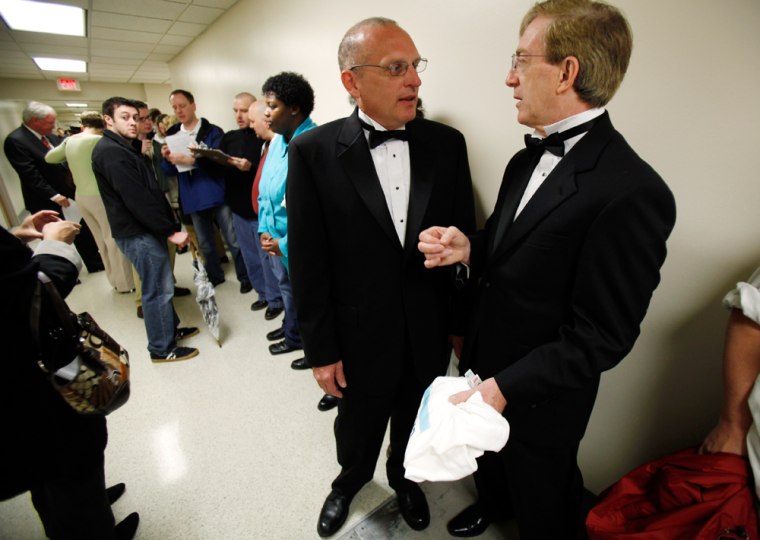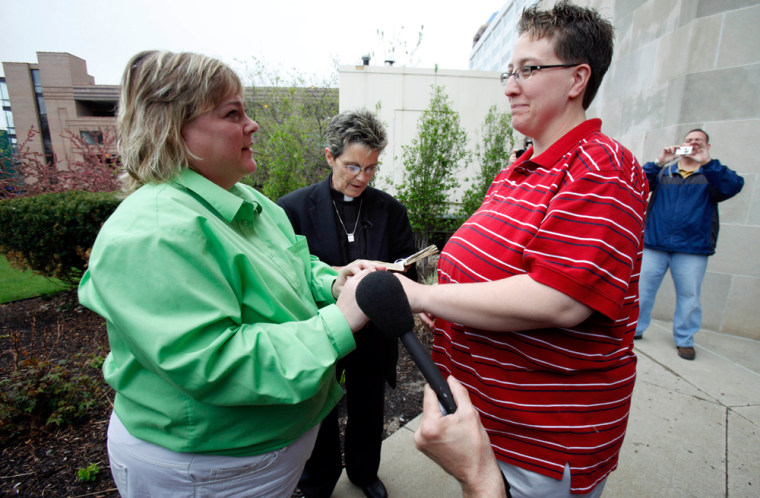Same-sex couples in Iowa began filing marriage license applications Monday after a state Supreme Court ruling legalizing gay unions took effect, and the first legal gay weddings took place shortly afterward.
Melisa Keeton and Shelley Wolfe were declared "legally married" by pastor Pat Esperanaza during a ceremony in front of Polk County administrative offices in Des Moines. It didn't take long before they were referring to one another as "wife."
"It's not very romantic is it?" Melisa Keeton joked about the location and media attention at the ceremony.
They will share the last name Keeton.
The marriage came less than an hour after the state Supreme Court ruling took effect. The couple was allowed to bypass the state's three-day waiting period before licenses are considered valid.
Officials have reported same-sex couples applying for marriage licenses in several counties.
Waiting for building to open
In Des Moines, about a dozen gay and lesbian couples waited in the rain for the Polk County administrative building to open.
Grant Lan, 35, and his partner Andrew Mahoney-Lan, 32, were first in line. The Windsor Heights couple planned to seek a waiver that would let them marry Monday.
"It's huge to be here first," Mahoney-Lan said.
Alicia Zacher, 24, and her 22-year-old fiancee Jessica Roach, both of Des Moines, said they have a 4 p.m. appointment to get married if they can get a waiver. They want to get married immediately after seeing how California voters reinstated a ban on same-sex marriage.
"You just never know when they'll try to take it away," Roach said.
A handful of Iowa's largest counties were seeing a rush right away, but foot traffic from same-sex couples began to slow toward midmorning.
At the Pottawattamie County recorder's office in western Iowa, Marilyn Hebing said about 10 couples filed their applications after the office opened, and more were slowly trickling in.
"It was pretty exciting, they were cheering out there," she said of the early morning crowd.
Many telephone calls
Dubuque County Recorder Kathy Flynn Thurlow said three couples had come into her office within the first few hours of opening. Her county, which borders Wisconsin, had gotten many telephone calls inquiring about the licenses.
"I expected even more (applications), already but we just don't know," she said.
In eastern Iowa, Johnson County Recorder Kim Painter, Iowa's only openly gay recorder, said that when she saw the court's declaration "we rolled open our windows and we've been busy."
She said that within the first half hour they had accepted about a half dozen applications and had about 10 more couples waiting to file. Some waited outside on the street under a tent and sipped coffee in what Painter called a "festive atmosphere."
Painter said she and her partner plan to apply to be married this week.
Rumors surfaced over the past week that some recorders would refuse to issue marriage licenses to same-sex couples over conflicts with their personal beliefs. Some conservative groups and lawmakers were accused of trying to recruit recorders to refuse the licenses.
State agencies sent out information to recorders statewide last week saying they could be removed from their positions if they don't follow the law and issue the licenses.
"There's a lot of people fishing around out there, but we'll see," said Painter. "I am quite optimistic that all 99 recorders will follow the rule of law and issue licenses."
No problems with licenses
Marilyn Dopheide, the Carroll County recorder and president of the Iowa County Recorder's Association, said that within about an hour of the recorders' offices opening there had been no problems with licenses being issued.
The Iowa Supreme Court's unanimous and emphatic decision on April 3 made Iowa the third state to allow same-sex marriage, joining Massachusetts and Connecticut. For six months last year, California's high court allowed gay marriage before voters banned it in November. Vermont has passed a law that will take effect in September.
Decision upheld
In its decision, the Iowa Supreme Court upheld an August 2007 decision by a Polk County District Court judge who found that a state law limiting marriage to a man and a woman violates the constitutional rights of equal protection. One couple was married in 2007 before the Polk County judge ordered a stay on his decision.
Gay marriage opponents have no other legal options to appeal the case to the state or federal level because they were not parties to the lawsuit and there were no federal issues raised in the case.

Their only recourse appears to be a constitutional amendment, which couldn't get on the ballot until 2012 at the earliest. A constitutional convention could be called earlier, but that is unlikely.
Iowa's same-sex marriage case began in 2005 when Lambda Legal, a New York-based gay rights organization, sued on behalf of six gay and lesbian Iowa couples.
Iowa has a history of being at the forefront on social issues. It was among the first states to legalize interracial marriage and to allow married women to own property. It was also the first state to admit a woman to the bar to practice law and was a leader in school desegregation.
